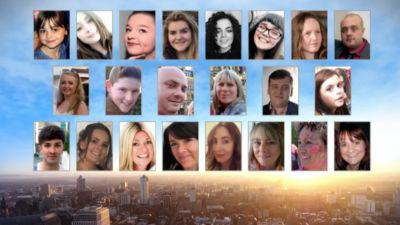Manchester Arena victim told paramedic: "I'm going to die, aren't I?"

A victim of the Manchester Arena attack who was only evacuated from the scene more than 40 minutes after the bombing told a paramedic: "I'm going to die, aren't I?", a public inquiry heard.
John Atkinson, 28, was not taken from the blast site for 46 minutes, before being carried on a cardboard advertising hoarding to a casualty clearing station.
He was then left for a further 24 minutes "with little done for him" and only taken to hospital 90 minutes after the bombing.
Mr Atkinson, a care worker from Manchester, died from blood loss shortly afterwards.
His treatment was highlighted by John Cooper QC, who represents 12 families of victims, in an opening statement to the public inquiry in Manchester.
Mr Cooper set out a number of issues questioning the emergency services preparedness and response to the attack in 2017.
The first paramedic arrived on the scene in the City Rooms, the foyer of the Arena where the bomb exploded, 19 minutes after the blast and was the only one there for the first 40 minutes until two more arrived, the inquiry has heard.
Mr Atkinson who had tried to crawl away from the blast scene on his hands and knees said to a paramedic: "I'm going to die, aren't I?"
The paramedic responded: "Not on my watch you're not."
But there were no stretchers and Mr Atkinson was carried on a cardboard hoarding, which broke and he dropped from knee height onto a crash barrier, also being used to move the injured before he was taken to hospital.
A member of the public, Ronald Blake, who helped Mr Atkinson has told the inquiry: "It felt like ages before anybody came to help."
Mr Cooper said: "Could John have been saved?
"Was he attended to quickly enough?"
He questioned the lack of stretchers, medical and security resources at the Arena and whether this was due to "penny pinching".
And although the fire service was notified within three minutes of the bombing, it was two hours before the first firefighters were at the scene, Mr Cooper said.
He said the UK threat level at the time was "severe" and an attack, "highly likely".
He cited an operation just a year before when police and emergency services planned for a roaming terror attack which highlighted poor communication and "significant delays" in the response to such an event.
This dress rehearsal "should have been a wake-up call", Mr Cooper said, but the "track record" of some organisations was: "They simply do not learn lessons and do not heed warnings."
The public inquiry, chaired by Sir John Saunders, a retired High Court judge, is investigating events before, during and after the attack at the end of an Ariana Grande concert on May 22 2017.
Suicide bomber Salman Abedi, 22, surrounded by the throng of elated youngsters leaving the concert, exploded his shrapnel-packed rucksack bomb, sending thousands of nuts and bolts shredding everything in their path.
The bomber's brother Hashem Abedi, now 23, was in August jailed for life with a minimum 55 years before parole, for his part in the deadly bomb plot, which also left hundreds injured.
The chairman will make a report and recommendations once all the evidence is heard next spring.
The hearing was adjourned until Tuesday morning.